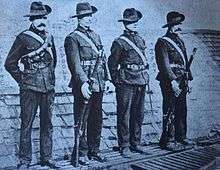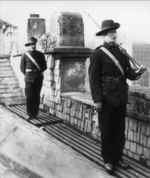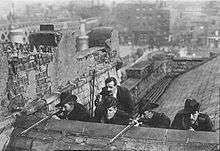Kit Poole
| Christopher "Kit" Poole | |
|---|---|
 Christopher Poole (second from left) atop a building with three other Irish Citizen Army members. | |
| Born |
17 December 1875 Dublin, Ireland |
| Died |
27 November 1965 (aged 89) Dublin, Ireland |
| Allegiance | British Commonwealth, later Irish Citizen Army |
| Years of service |
1894–1906 (British Commonwealth) 1913-1918 (Irish Citizen Army) |
| Rank |
Private (British Commonwealth) Captain (Irish Citizen Army) |
| Unit | 2nd East Yorkshire Regiment (British Commonwealth) |
| Commands held | Second in Command of Irish Citizen Army, St Stephen's Green Garrison, Easter Week, 1916 |
| Battles/wars |
Tirah Campaign Second Boer War Easter Rising |
| Awards |
King's South Africa Medal (1901 & 1902 Clasps) Queen's South Africa Medal (1902) |
| Spouse(s) | Alice Fay |
Christopher "Kit" Poole (17 December 1875 – 27 November 1965) was an Irish soldier and military tactician who fought in the Tirah Campaign and the Second Boer War as a British Army Private, as well as a captain of the Irish Citizen Army during the Easter Rising. During the citizen army's inception in 1913, he was a member of the group's initial provisional council alongside Jack White, James Larkin, P. T. Daly and Constance Markievicz,[1] and would go on to take up a permanent position on the army's executive committee.[2] He was also a pivotal figure during the 1916 Easter Rising, positioned as second in command at the battle of St. Stephen's Green under citizen army commandant Michael Mallin[3][4] where they held out for six days against British forces, ending the engagement when the British brought them a copy of Pearse's surrender order.[5]
Early life
Poole was born Christopher Damian Poole at Capel Street in Dublin City, the second of six children to parents Frederick Poole, a tailor, and Mary Jane Madden, a house wife. Poole grew up in a nationalist environment; Joseph Poole, his older brother and member of the Fenian Brotherhood, was executed in 1883 for a murder which he did not commit. Also brothers; Vincent, John Denis, Patrick, and Patricks son, John, took active roles in the Rising and the Civil War.[6]
Enlistment & Service in British Army
Poole enlisted with the British army at the age of 18 (30/7/94) and was assigned to the 2nd East Yorkshire Regiment alongside his future commandant, Michael Mallin. Poole served for a period in South Africa, earning the Queen's South Africa Medal and two King's South Africa Medal clasps for his service during the Boer War, after which he retired from British Military Service.[7]
Irish Citizen Army & Easter Rising

Six years after returning to Ireland, Poole was elected to the founding provisional committee of the Irish Citizen Army alongside Jack White, Constance Markievicz and Jim Larkin.[8] Poole's reputation while fighting in South Africa had made an impression on founder Jack White and his eventual fellow soldiers while fighting at Stephen's Green. Poole also owned the only Lee Enfield rifle in possession of the army at its inception, and would go on to train enlistees how to carry weapons (hurley sticks were used in training to simulate the weight of the rifles) prior to entering battle.[9]
During the Easter Rising, Poole was Commandant Mallin's most senior officer, earning him the rank of captain and placing him third in hierarchal command of the ICA after Connolly and Mallin.[10] After the insurgents took control of the Green and the civilians were evacuated, Poole allocated a company of men to secure each gate entrance. Gates were barricaded with wheelbarrows, gardening tools and park benches. Meanwhile, Poole ordered a number of men to dig slit trenches and foxholes in the style he had used prior in South Africa. When Mallin ordered the evacuation of the Green on Tuesday 25 April, Poole organised the fall back to the Royal College of Surgeons which had been secured by Constance Markievicz prior.[11]
After Padraig Pearse's surrender order was accepted by the British side, Poole was tried and sent to Stafford Jail detention barracks in England before being transferred to Frongoch internment camp in Wales with the majority of the remaining soldiers. He was released under the general amnesty of Christmas 1916, and retired from the Irish Citizen Army in 1919.[12]

References
- ↑ Charles Townshend, "Easter 1916: The Irish Rebellion", p.41.
- ↑ Matthews, Ann. The Irish Citizen Army (2014), p. 36
- ↑ Seamus Kavanagh, letter in Military Service Pensions Collection, Military Archive IE/MA/MSPC/MSP34REF10145
- ↑ Statement by Christopher Crothers, Military Service Pensions Collection, Military Archive IE/MA/MSPC/MSP34REF2186
- ↑ "Mauser pistol handed to me by Countess Markievicz when she surrendered to me at the College of Surgeons Dublin in 1916 with Commandant Mallin. H. E. de C. Wheeler. This was presented to me by General Lowe". Catalogue. National Library of Ireland. Retrieved 5 January 2016.
- ↑ "Vincent Poole - The 1916 Relatives Association". Retrieved 12 September 2016.
- ↑ "Military Documents: British Army Service Forms of Christopher Poole". Retrieved 12 September 2016.
- ↑ "O'Casey, Seán The Story of the Irish Citizen Army (1919)". Retrieved 2 April 2016..
- ↑ "The Pooles of 1916 Documentary". Retrieved 12 September 2016.
- ↑ "Easter Rising leader executed in 1916: Michael Mallin". Retrieved 7 October 2016.
- ↑ "The Pooles of 1916 Documentary". Retrieved 12 September 2016.
- ↑ "Military Documents: British Army Service Forms of Christopher Poole". Retrieved 12 September 2016.